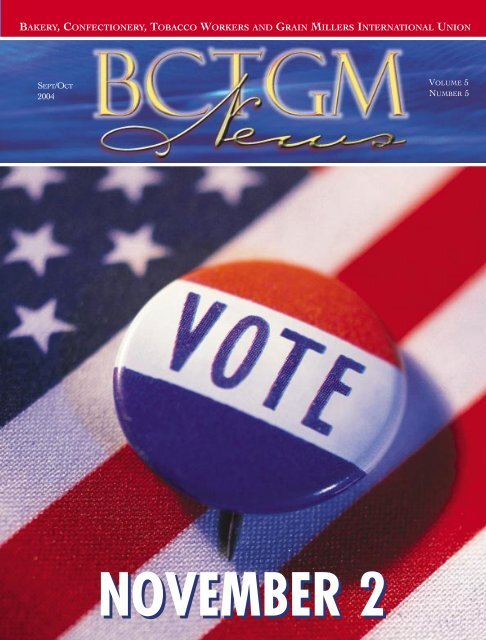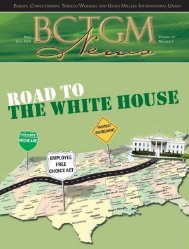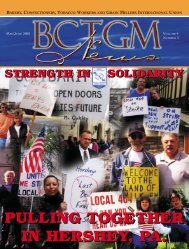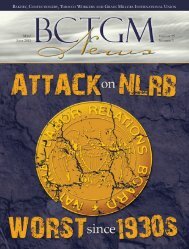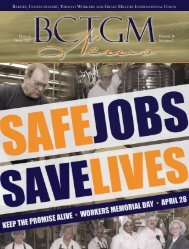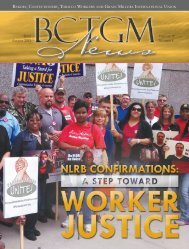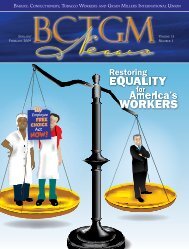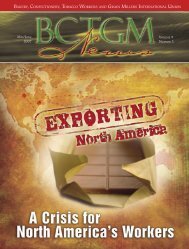to view/print. - Bakery, Confectionery, Tobacco Workers and Grain ...
to view/print. - Bakery, Confectionery, Tobacco Workers and Grain ...
to view/print. - Bakery, Confectionery, Tobacco Workers and Grain ...
Create successful ePaper yourself
Turn your PDF publications into a flip-book with our unique Google optimized e-Paper software.
BAKERY, CONFECTIONERY, TOBACCO WORKERS AND GRAIN MILLERS INTERNATIONAL UNION<br />
SEPT/OCT<br />
2004<br />
VOLUME 5<br />
NUMBER 5<br />
NOVEMBER 2
the<br />
President’s Message<br />
“The test of our progress is not whether we add more <strong>to</strong> the abundance of those who<br />
have much; it is whether we provide enough for those who have <strong>to</strong>o little.”<br />
Franklin D. Roosevelt, 32nd President of the United States<br />
With these profound words,<br />
Franklin Roosevelt set a st<strong>and</strong>ard<br />
by which Americans are<br />
able <strong>to</strong> judge our society <strong>and</strong> our progress as a nation.<br />
For more than 70 years, through Democratic <strong>and</strong><br />
Republican Administrations, we have made progress.<br />
Unfortunately, the record of the last four years during<br />
the Bush Administration shows the nation failing<br />
the challenge put forth by FDR. Instead of progress,<br />
we are seeing a decline in the st<strong>and</strong>ard of living of the<br />
poor <strong>and</strong> working families.<br />
The most reliable <strong>and</strong> accurate source of information<br />
<strong>to</strong> determine our nation’s condition comes from<br />
the Census Bureau. No doubt statistics are dry, but<br />
they tell an important s<strong>to</strong>ry.<br />
According the Census Bureau, last year the poverty<br />
rate grew by nearly 13 percent, sending millions more<br />
Americans in<strong>to</strong> poverty. Many of these people are<br />
working Americans who have jobs that simply don’t<br />
pay enough. Average household income fell between<br />
2000 <strong>and</strong> 2003 mostly because of job loss or the<br />
replacement of high-wage jobs with lower-wage jobs.<br />
Under President Bush, the nation has experienced<br />
the greatest sustained job loss since Franklin<br />
Roosevelt uttered those words in the depths of the<br />
nation’s greatest economic crisis in its his<strong>to</strong>ry. Since<br />
January of 2001, the economy has lost millions of<br />
jobs, mostly in the well-paid manufacturing sec<strong>to</strong>r.<br />
The jobs statistics may have improved a little over<br />
the past several months, but the reality is that there<br />
are still fewer Americans working <strong>to</strong>day than there<br />
were four years ago. Moreover, many of the new jobs<br />
being created pay workers less than the ones they lost.<br />
<strong>Workers</strong> paychecks are shrinking <strong>and</strong> this is the heart<br />
of the nation’s economic distress.<br />
The nation’s health care crisis compounds this<br />
problem. The share of people with employment-based<br />
health care coverage fell <strong>to</strong> the lowest level in 10<br />
years. Nearly three-quarters of a million more full-time<br />
workers had no health insurance coverage in 2003<br />
than in 2002.<br />
We know that adults <strong>and</strong> children who do not<br />
have health care coverage are not able <strong>to</strong> get the treatment<br />
<strong>and</strong> preventative care that they need <strong>to</strong> stay<br />
healthy. This is why the BCTGM fights so hard in<br />
negotiations <strong>to</strong> maintain our health benefit coverage at<br />
existing levels.<br />
As long as the vast majority of working Americans’<br />
paychecks shrink <strong>and</strong> more <strong>and</strong> more families do not<br />
have access <strong>to</strong> affordable health care, our st<strong>and</strong>ard of<br />
living will continue <strong>to</strong> decline. No amount of happy<br />
talk or 30-second campaign commercials can change<br />
the fundamental truth that American workers are<br />
caught in a race <strong>to</strong> the bot<strong>to</strong>m that is made worse by<br />
the policies of George W. Bush.<br />
President Bush sold the corners<strong>to</strong>nes of his economic<br />
program, trillion-dollar tax cuts for the wealthy<br />
<strong>and</strong> largest corporations <strong>and</strong> multiple free-trade deals,<br />
on the basis that they would create millions of new<br />
jobs <strong>and</strong> increase the st<strong>and</strong>ard of living of American<br />
workers.<br />
The Census Bureau tells us these policies have<br />
failed <strong>and</strong> failed miserably. Not only have these policies<br />
accelerated the loss of good jobs, led <strong>to</strong> declining<br />
wage rates <strong>and</strong> more families without health insurance,<br />
they have also h<strong>and</strong>ed future generations budget<br />
deficits <strong>and</strong> national debt that almost guarantee that<br />
the race <strong>to</strong> the bot<strong>to</strong>m will continue for decades <strong>to</strong><br />
come. Tax cuts for the wealthy <strong>to</strong>day mean tax<br />
increases for working people <strong>to</strong>morrow.<br />
As representatives of working people, labor unions<br />
must always seek <strong>to</strong> improve the lives of their members.<br />
That is our responsibility. And that is the reason<br />
the BCTGM has been tirelessly working <strong>to</strong> change the<br />
political leadership of this country, beginning with the<br />
election of Sena<strong>to</strong>r John Kerry as the next President of<br />
the United States.<br />
On November 2, we will know which direction our<br />
nation will take for the next four years. Moreover, we<br />
will have a better idea as <strong>to</strong> whether or not we will<br />
reverse course <strong>and</strong> begin <strong>to</strong> travel once again along<br />
the path of progress Franklin Roosevelt so clearly<br />
marked.<br />
Frank Hurt<br />
BCTGM International President<br />
Official Publication of the <strong>Bakery</strong>, <strong>Confectionery</strong>, <strong>Tobacco</strong><br />
<strong>Workers</strong> <strong>and</strong> <strong>Grain</strong> Millers International Union<br />
10401 Connecticut Avenue, Kensing<strong>to</strong>n, Maryl<strong>and</strong> 20895-3961<br />
(301) 933-8600<br />
www.bctgm.org<br />
Frank Hurt, Edi<strong>to</strong>r<br />
Corrina A. Christensen, Assistant Edi<strong>to</strong>r<br />
BCTGM GENERAL EXECUTIVE BOARD<br />
President Frank Hurt • Secretary-Treasurer David B. Durkee • Executive Vice Presidents<br />
Joseph Thibodeau • Larry Barber • Vice Presidents Jeanne Graham • Shawn J. Grimm •<br />
Harry A. Guildner • Anthony L. Johnson • Richard Johnson • Sean Kelly •<br />
Michael T. Konesko • Arthur Montminy • Robert Oakley • R<strong>and</strong>y Roark •<br />
Ronald D. Schreiber • T.J. Warren<br />
BCTGM GENERAL EXECUTIVE BOARD MEMBERS<br />
Joyce Als<strong>to</strong>n • Edward Burpo • R<strong>and</strong>y W. Fulk •<br />
Oscar B. Giles • Johnny Jackson • Paul LaBuda •<br />
Richard Lewis • Narcisco Martas • Herbert W. Marx • Danny Murphy •<br />
Donna Scarano • Brad Schmidt • William Spr<strong>and</strong>el • Doyle Townson<br />
BCTGM News (ISSN 1525-4860) is published bi-monthly by the <strong>Bakery</strong>, <strong>Confectionery</strong>, <strong>Tobacco</strong> <strong>Workers</strong> <strong>and</strong> <strong>Grain</strong> Millers<br />
International Union, 10401 Connecticut Avenue, Kensing<strong>to</strong>n, MD 20895-3961. Periodicals postage paid at Kensing<strong>to</strong>n, MD <strong>and</strong> at additional<br />
mailing offices. Subscription <strong>to</strong> new members only. Postmaster: Send address changes <strong>to</strong> BCTGM News, 10401 Connecticut<br />
Avenue, Kensing<strong>to</strong>n, MD 20895-3961.<br />
2<br />
BCTGM News
BCTGM Protests Bush<br />
Overtime Pay Take-Away<br />
BCTGM International President<br />
Frank Hurt, Executive Officers<br />
<strong>and</strong> International staff joined<br />
nearly 1,000 other union<br />
activists outside the U.S.<br />
Department of Labor in<br />
Washing<strong>to</strong>n D.C. on August 23<br />
<strong>to</strong> protest President George W.<br />
Bush’s overtime pay take-away.<br />
Carrying BCTGM signs, “Bush<br />
Thinks <strong>Workers</strong> are Worth Less”<br />
<strong>and</strong> “S<strong>to</strong>p the Bush Pay Grab,”<br />
the union protested the changes<br />
<strong>to</strong> the Fair Labor St<strong>and</strong>ards Act,<br />
the first major attack on the law<br />
since it was enacted in 1938.<br />
“What kind of leader purposely<br />
cuts the paychecks of six<br />
million working Americans at a<br />
time when the economy forces<br />
workers <strong>to</strong> work harder <strong>and</strong><br />
longer <strong>to</strong> make ends meet?,” asks<br />
Hurt. “Bush’s decision <strong>to</strong> gut this<br />
nation’s overtime laws is heartless.<br />
Overtime pay holds many<br />
families above the poverty line<br />
<strong>and</strong> <strong>to</strong> make them work longer<br />
BCTGM Intl. staff <strong>and</strong> family<br />
were among the nearly 1,000<br />
protesters at the rally against<br />
the Bush overtime pay grab.<br />
hours for free is unconscionable,”<br />
Hurt adds.<br />
Under the new rules, most<br />
workers earning<br />
$23,660 a year or<br />
less are guaranteed<br />
time-<strong>and</strong>-a-half pay<br />
for every working<br />
hour over 40 per<br />
week, just as federal<br />
law requires. But<br />
after that, the rules<br />
open a wide range<br />
of methods <strong>to</strong> bosses<br />
who want <strong>to</strong> cut<br />
out workers’ overtime<br />
pay. Up <strong>to</strong> six<br />
million workers will<br />
lose an average of $161 per<br />
week, according <strong>to</strong> the AFL-CIO.<br />
<strong>Workers</strong> covered by a union contract<br />
must bargain <strong>to</strong> retain overtime<br />
pay protections. “And we<br />
know employers will now come<br />
at us hard on our overtime language,”<br />
notes Hurt.<br />
Sena<strong>to</strong>r Tom Harkin (D-Iowa)<br />
spoke at the rally <strong>and</strong> promised<br />
the crowd that Senate Democrats<br />
will continue the fight <strong>to</strong> block<br />
the Bush pay cut. Harkin, who<br />
authored the three measures <strong>to</strong><br />
block the regulations, said, “Time<strong>and</strong>-a-half<br />
pay accounts for 25<br />
percent of the <strong>to</strong>tal income of<br />
those who work overtime. If<br />
employers no longer have <strong>to</strong> pay<br />
time-<strong>and</strong>-a-half for overtime work,<br />
they will have an incentive <strong>to</strong><br />
dem<strong>and</strong> longer hours instead of<br />
creating more jobs, taking money<br />
from the pockets of middle-class<br />
working families. Protecting workers’<br />
overtime is essential <strong>to</strong> job<br />
creation.”<br />
Overtime rallies like the one<br />
BCTGM Intl. President Frank<br />
Hurt (left) explains the effects<br />
of the overtime pay take-away<br />
<strong>to</strong> an NBC reporter as Intl.<br />
Exec. Vice President Joe<br />
Thibodeau (center) <strong>and</strong> Intl.<br />
staff person Matthew Clark<br />
(right) listen outside the Dept.<br />
of Labor on Aug. 23.<br />
at the Department of Labor <strong>to</strong>ok<br />
place throughout the country on<br />
August 23. Since Bush<br />
announced the overtime pay<br />
take-away in March 2003, workers<br />
have sent more than 1.6 million<br />
email, mail <strong>and</strong> fax messages<br />
<strong>to</strong> the White House,<br />
Congress <strong>and</strong> the Department of<br />
Labor protesting the assault on<br />
the nation’s wage <strong>and</strong> hour laws.<br />
AFL-CIO President John<br />
Sweeney, who also spoke at the<br />
rally, reminded the crowd that<br />
the fight <strong>to</strong> save overtime pay is<br />
far from over <strong>and</strong> another<br />
recourse is the November presidential<br />
election. “If Bush will not<br />
st<strong>and</strong> on the side of working people,<br />
then we will use our democratic<br />
process <strong>to</strong> elect a president<br />
who will,” he declared.<br />
To sign the BCTGM’s<br />
new petition <strong>to</strong> save overtime<br />
pay, visit the BCTGM E-<br />
Activist Network www.unionvoice.org/campaign/Otpetition.<br />
September/Oc<strong>to</strong>ber 2004<br />
www.bctgm.org<br />
3
OVERTIME<br />
UNDER<br />
ATTACK<br />
By Sen. Tom Harkin (D-Iowa)<br />
In April, the Bush<br />
Administration issued final<br />
rules governing eligibility for<br />
overtime. Make no mistake, this<br />
radical rewrite of the rules is<br />
designed <strong>to</strong> strip millions of<br />
workers of their right <strong>to</strong><br />
fair compensation. It is a<br />
frontal attack on the 40-<br />
hour workweek, pushed<br />
aggressively by the<br />
Administration without a<br />
single public hearing.<br />
Since passage of the<br />
Fair Labor St<strong>and</strong>ards Act<br />
in 1938, overtime rights<br />
<strong>and</strong> the 40-hour workweek<br />
have been sacrosanct—respected<br />
by presidents<br />
of both parties.<br />
But nothing is sacred <strong>to</strong><br />
the Bush Administration. Nor<br />
does the Administration seem <strong>to</strong><br />
care that these new rules will<br />
hurt job creation.<br />
If employers can more easily<br />
deny overtime pay, they will simply<br />
push their current employees<br />
<strong>to</strong> work longer hours without<br />
compensation. With millions<br />
Americans out of work, why give<br />
employers a major new disincentive<br />
<strong>to</strong> hire new workers?<br />
Indeed, when the first overtime<br />
statutes were written in<br />
1938, during the Great<br />
Depression, a major aim was <strong>to</strong><br />
encourage the creation of new<br />
jobs. But there is a more<br />
poignant argument for overtime.<br />
As one single mother <strong>to</strong>ld me,<br />
when she leaves work after a difficult<br />
8-hour shift, her “second<br />
shift”—cooking <strong>and</strong> caring for<br />
her family—begins. She <strong>to</strong>ld me<br />
that her time at home is truly her<br />
“premium time,” the most valuable<br />
time of her day. And if she<br />
is going <strong>to</strong> be required <strong>to</strong> sacrifice<br />
that premium time, then she<br />
ought <strong>to</strong> receive premium pay.<br />
The Bush Administration disagrees.<br />
The final rule was issued<br />
in the spring <strong>and</strong> <strong>to</strong>ok effect<br />
August 23, just before Labor Day.<br />
It will deny time-<strong>and</strong>-a-half<br />
overtime pay <strong>to</strong> many workers<br />
earning as little as $23,660.<br />
Nonetheless, the Administration’s<br />
public posture is all smiles <strong>and</strong><br />
happy talk, including the audacious<br />
claim that no workers earning<br />
less than $100,000 a year will<br />
lose their right <strong>to</strong> overtime.<br />
This claim is demonstrably<br />
false. In July, a study by the<br />
Economic Policy Institute (EPI)<br />
concluded that at least six million<br />
U.S. workers will lose their right<br />
<strong>to</strong> overtime under the final rule.<br />
Under the old rule, employees<br />
were required <strong>to</strong> spend the<br />
majority of their time—50 percent<br />
or more—doing administrative,<br />
management or professional<br />
work in order <strong>to</strong> lose their right<br />
<strong>to</strong> overtime. But under the new<br />
rule, employees who do even a<br />
small amount of administrative,<br />
management or professional<br />
work during the day can lose<br />
their overtime rights.<br />
An independent re<strong>view</strong> of the<br />
new rule by former Department<br />
of Labor (DOL) officials concluded<br />
that in every instance where<br />
DOL made some sort of change<br />
<strong>to</strong> the existing rule, it chose <strong>to</strong><br />
weaken the criteria for overtime<br />
exemptions, thereby making<br />
workers vulnerable <strong>to</strong> the loss of<br />
overtime eligibility.<br />
Ironically, the Administration<br />
originally argued its<br />
new overtime plan<br />
was needed <strong>to</strong> clarify<br />
the rules <strong>and</strong> reduce<br />
litigation. But the final<br />
rule is shot through<br />
with calculated ambiguity<br />
that clearly<br />
favors employers. This<br />
will lead <strong>to</strong> scores of<br />
lawsuits <strong>and</strong> years of<br />
litigation as workers<br />
fight <strong>to</strong> retain their<br />
overtime rights. If<br />
increasingly conservative<br />
courts rule in favor of<br />
employers, countless additional<br />
workers will lose their right <strong>to</strong><br />
overtime.<br />
American workers are fed up<br />
with the Administration’s<br />
schemes <strong>and</strong> spin. They deserve<br />
an iron-clad guarantee that their<br />
overtime rights are safe. If Mr.<br />
Bush <strong>and</strong> DOL are sincere in<br />
their stated desire <strong>to</strong> preserve<br />
overtime, they can prove it by<br />
supporting my legislation <strong>to</strong><br />
guarantee that workers who are<br />
entitled <strong>to</strong> overtime pay as a<br />
result of their job duties under<br />
the old rules will not lose that<br />
right under the new rules.<br />
4<br />
BCTGM News
100 Years Young: Local 114<br />
Celebrates a His<strong>to</strong>ry of Activism<br />
AAfter 100 years of defending the<br />
rights of bakery workers in the<br />
Pacific Northwest, BCTGM Local<br />
114 (Portl<strong>and</strong>, Ore.) shows no<br />
signs of slowing down. On<br />
August 27, the local celebrated<br />
its 100th anniversary with the<br />
same energy <strong>and</strong> devotion that<br />
the founding members of the<br />
union displayed, according <strong>to</strong><br />
Local 114 Financial Secretary-<br />
Treasurer Laurel Koch.<br />
“It’s amazing how a lot of the<br />
issues that this union fought for<br />
100 years ago—better<br />
wages, hours <strong>and</strong> working<br />
conditions—are the<br />
same issues we fight for<br />
<strong>to</strong>day. On that level, not<br />
much has changed,”<br />
said Koch.<br />
Koch <strong>and</strong> a team of<br />
volunteers spent months<br />
researching the his<strong>to</strong>ry<br />
of the union for a booklet<br />
that was given <strong>to</strong><br />
Local 114 members in<br />
honor of the local’s 100-<br />
year anniversary. The<br />
research team consisted<br />
of Koch, members<br />
Nancy Milner, Sharon<br />
Graham, Georgene<br />
Barragan, <strong>and</strong> her<br />
daughter, Erin.<br />
The local began with members<br />
at just 15 retail shops.<br />
Today, Local 114 represents more<br />
than 1,140 workers at some 160<br />
retail <strong>and</strong> wholesale bakeries—<br />
most of the wholesale bakeries in<br />
the Portl<strong>and</strong> metropolitan area<br />
under union contract.<br />
“In March of 1904, union<br />
label bread was seen for the first<br />
time. A committee had been<br />
appointed <strong>to</strong> visit various retail<br />
s<strong>to</strong>res <strong>and</strong> request the managers<br />
<strong>to</strong> buy no bread unless it has the<br />
seal of organized labor stamped<br />
upon its side,” writes the<br />
research team in the Bakers<br />
Union Local 114 His<strong>to</strong>ry.<br />
The fight of the Bakers Union<br />
in 1904 was borne directly upon<br />
the health <strong>and</strong> welfare of the<br />
home. The bakers fight was <strong>to</strong><br />
give families bread, cake <strong>and</strong><br />
pies prepared under sanitary<br />
conditions. “The Union Label<br />
Local 114 Bus. Agt. Gene Beaudoin (left) Fin.<br />
Secy. Laurel Koch (center) <strong>and</strong> member<br />
Georgene Barragan display a pho<strong>to</strong> of the Local<br />
114 “Knights of Peel” in the 1919 Labor Day<br />
parade in Portl<strong>and</strong>.<br />
was a guarantee that your bakery<br />
products were prepared in<br />
wholesome, clean, well-ventilated<br />
shops from materials that<br />
were free from poisons <strong>and</strong> adulterants,”<br />
notes Koch.<br />
“Local 114 even required a<br />
medical exam for members <strong>to</strong><br />
make sure they were free of<br />
tuberculosis or other contagious<br />
diseases. The Union Label s<strong>to</strong>od<br />
not only for quality but also<br />
cleanliness,” Koch recalls.<br />
By 1912, Local 114 had been<br />
so adamant about the sanitary<br />
conditions of its shops, Portl<strong>and</strong><br />
could now boast of having the<br />
most sanitary union bakeries in<br />
the United States. Local 114<br />
helped bakers win a 35-hour<br />
workweek. At the time, bakers<br />
worked for 16 hours a day, six<br />
days a week. Later, in the mid-<br />
1950s, the local was able <strong>to</strong><br />
secure employer-paid pensions<br />
<strong>and</strong> language protecting<br />
members from the effects<br />
of mechanization. Koch<br />
also discovered language<br />
in an early contract that<br />
called on employers “<strong>to</strong><br />
pay girls the same wage as<br />
the men they replaced.”<br />
“Local 114 s<strong>to</strong>od strong<br />
<strong>and</strong> survived, several<br />
times coming very close <strong>to</strong><br />
being put out of business<br />
by anti-union forces,”<br />
Koch recalls. “It is simply<br />
amazing that we continue<br />
<strong>to</strong> fight for the same things<br />
<strong>to</strong>day that we’ve fought<br />
hard <strong>and</strong> won in the past.<br />
His<strong>to</strong>ry is a revolving<br />
door—a different angle but<br />
the same issues.<br />
“Throughout our his<strong>to</strong>ry, we<br />
have grown in strength <strong>and</strong> in<br />
numbers. There is no doubt that<br />
this local union will continue <strong>to</strong><br />
add a wealth of his<strong>to</strong>ry <strong>and</strong> color<br />
<strong>to</strong> the books of the BCTGM for<br />
many years <strong>to</strong> come,” concludes<br />
Koch, who retirees later this year<br />
after more than 22 years as a<br />
Local 114 officer <strong>and</strong> 36 years in<br />
the baking industry.<br />
September/Oc<strong>to</strong>ber 2004 www.bctgm.org 5
Local 369G Lockout Ends in Minnesota<br />
RRenville, Minn.—Solidarity <strong>and</strong><br />
resolve led <strong>to</strong> vic<strong>to</strong>ry for members<br />
of BCTGM Local 369G—who<br />
were locked out by Southern<br />
Minnesota Beet Sugar Cooperative<br />
for four weeks—as they<br />
returned <strong>to</strong> work on August 25<br />
after approving a new contract.<br />
The 220 BCTGM members<br />
were locked out of the plant on<br />
July 29 after they rejected the<br />
company’s contract offer that<br />
incorporated substantial changes<br />
in their health care plan, including<br />
increased deductibles <strong>and</strong><br />
employee premium payments.<br />
Under the new three-year<br />
agreement, workers will not pay<br />
health insurance premiums <strong>and</strong><br />
will pay only small increases in<br />
medical deductibles, prescription<br />
co-pays <strong>and</strong> out-of-pocket maximums.<br />
The contract also includes<br />
annual pay increases of two percent<br />
<strong>and</strong> annual pension increases<br />
of $1 per month of service.<br />
The first lockout ever at the<br />
nearly 30-year old plant came as<br />
a shock <strong>to</strong> many. Union members<br />
maintained 24-hour informational<br />
pickets outside the<br />
plant during the lockout <strong>to</strong> educate<br />
the community.<br />
According <strong>to</strong> Local 369G<br />
President R<strong>and</strong>y Billmeier, during<br />
the lockout worker morale<br />
was high thanks <strong>to</strong> the community<br />
support they received.<br />
Bottled water, soda <strong>and</strong> snacks<br />
were delivered regularly with<br />
words of encouragement <strong>to</strong> workers<br />
outside the plant. “The workers<br />
really enjoyed the support.<br />
We had a lot of folks on our<br />
side,” recalls Billmeier.<br />
In a larger community, a lockout<br />
of 220 workers might be<br />
invisible, but not in a <strong>to</strong>wn like<br />
Renville, population 1,323. “The<br />
lockout affected everyone in the<br />
community,” said Local 369G<br />
member Craig Gednalske.<br />
The Southern Minnesota Beet<br />
Sugar Cooperative is a huge<br />
complex on a road at the edge of<br />
Renville, located about 100 miles<br />
west of the Twin Cities. Along the<br />
backside of the plant are large<br />
lots where beets are piled high<br />
after harvest. During the fall <strong>and</strong><br />
winter, pipes run through the<br />
piles, carrying coolant <strong>to</strong> keep<br />
the mounds frozen <strong>and</strong> allowing<br />
the processing of the beets <strong>to</strong><br />
take place over several months.<br />
The cooperative refines beets<br />
in<strong>to</strong> sugar, lives<strong>to</strong>ck feed <strong>and</strong><br />
other products.<br />
Farmers act as shareholders<br />
for the acres of beets planted in<br />
14 counties across southwestern<br />
Minnesota. They bring their crop<br />
<strong>to</strong> the plant, where union members<br />
turn the beets in<strong>to</strong> sugar for<br />
c<strong>and</strong>y companies <strong>and</strong> other business.<br />
August is usually a critical<br />
time at the cooperative, as workers<br />
get the plant ready for harvest,<br />
which generally begins in<br />
September. All the staff <strong>and</strong><br />
equipment must be ready <strong>to</strong><br />
unload hundreds of truckloads of<br />
beets, slice <strong>and</strong> process them<br />
<strong>and</strong> bag <strong>and</strong> ship out millions of<br />
pounds of products.<br />
“There is a lot of work <strong>to</strong> be<br />
done,” said Marie Revier, a 15-<br />
year employee. Echoing Revier is<br />
Gerald Reinke, who has been with<br />
the company since its beginning.<br />
“We basically make this place go,”<br />
Reinke said. “We’re the ones who<br />
get down in all the dirt <strong>and</strong> cold.”<br />
Edi<strong>to</strong>rs Note: The pho<strong>to</strong>s<br />
<strong>and</strong> background material used<br />
with this article were provided<br />
by Workday Minnesota,<br />
www.workdayminnesota.org<br />
Local 369G maintained 24-<br />
hour informational pickets<br />
outside the main gate <strong>to</strong><br />
the Southern Minnesota<br />
Beet Sugar Coop. throughout<br />
the lockout.<br />
6<br />
BCTGM News
BCTGM Negotiates Nabisco Pattern<br />
BBCTGM negotia<strong>to</strong>rs reached a<br />
nationwide three-<strong>and</strong>-a-half year<br />
agreement with Kraft Foods North<br />
America in mid-September for the<br />
nine former Nabisco facilities.<br />
This was the second negotiated<br />
national agreement between the<br />
BCTGM <strong>and</strong> Kraft Foods since<br />
Kraft acquired Nabisco in 2001.<br />
The agreement, which runs<br />
through February 2008, was led by<br />
International Vice President Bob<br />
Oakley with the assistance of<br />
International Representative James<br />
Condran. Representatives from<br />
Local 26 (Denver), Local 42<br />
(Atlanta), Local 83 (Buena Park,<br />
Calif.), Local 300 (Chicago), Local<br />
358 (Richmond, Va.), Local 364<br />
(Portl<strong>and</strong>, Ore.), Local 492<br />
(Philadelphia), Local 719 (Fair<br />
Lawn, N.J.), <strong>and</strong> Local 802<br />
(Buffalo, N.Y.) made up the negotiating<br />
committee.<br />
According <strong>to</strong> Oakley, the negotiating<br />
committee had a clear<br />
underst<strong>and</strong>ing of what the members<br />
expectations were <strong>and</strong> the<br />
direction they wanted the negotia<strong>to</strong>rs<br />
<strong>to</strong> go in. “Our members <strong>to</strong>ld<br />
us quite clearly they wanted us <strong>to</strong><br />
do everything we could <strong>to</strong> protect<br />
their health benefits, increase<br />
their pensions <strong>and</strong> gain healthy<br />
wage increases,” said Oakley.<br />
“We set our sights on delivering a<br />
Pictured here are representatives<br />
from nine BCTGM local unions that<br />
made up the negotiating committee.<br />
BCTGM Intl. Vice Pres. <strong>and</strong> lead negotia<strong>to</strong>r Bob Oakley (right) <strong>and</strong><br />
Intl. Rep. Jim Condran (left) re<strong>view</strong> the final three-year national<br />
agreement between the BCTGM <strong>and</strong> Kraft Foods.<br />
fine contract tailored <strong>to</strong> their<br />
m<strong>and</strong>ate,” he said.<br />
Highlighting the negotiations<br />
was the maintenance of all<br />
health benefits, levels <strong>and</strong> costs<br />
for the life of the contract.<br />
BCTGM International President<br />
Frank Hurt congratulated the<br />
union negotia<strong>to</strong>rs for a job well<br />
done. “At a time when most<br />
companies are shifting the health<br />
insurance burden on<strong>to</strong> employees,<br />
our union is doing everything<br />
we can <strong>to</strong> protect our members<br />
benefits,” commends Hurt.<br />
In addition, the new agreement<br />
secures healthy pension<br />
increases for retirees. By the end<br />
of the contract, the company’s<br />
contribution rate will be<br />
increased <strong>to</strong> $1,600.00. In addition,<br />
beginning September 1,<br />
2004, the company will provide<br />
P-Plan 26 at a $15,600.00<br />
level. According <strong>to</strong> Hurt, securing<br />
a members well-being after retirement<br />
is always a priority. “Our<br />
dedicated members put in a<br />
tremendous amount of effort <strong>to</strong><br />
make this a successful company,”<br />
said Hurt. “This contract rewards<br />
them for years of hard work.”<br />
The contract also provides for<br />
significant wage increases, new<br />
contract language for pay for<br />
military leave, <strong>and</strong> changes <strong>to</strong><br />
the attendance bonus. Local 42<br />
Business Agent <strong>and</strong> member of<br />
the negotiating committee,<br />
Johnny Jackson said his members<br />
were very happy about the<br />
new agreement. “We received<br />
tremendous support from our<br />
membership going in<strong>to</strong> negotiations.<br />
We came away from the<br />
table with a contract we were<br />
proud <strong>to</strong> present back <strong>to</strong> them,”<br />
concludes Jackson.<br />
September/Oc<strong>to</strong>ber 2004 www.bctgm.org 7
WHO’S ON OUR SIDE: WHAT’S ATSTAKE NOVEMBER 2<br />
John Kerry<br />
Good Jobs<br />
Plans <strong>to</strong> create 10 million new jobs in his first<br />
four years as president. His energy policy alone will<br />
create some 500,000 good jobs. (Associated Press,<br />
3/25/04)<br />
Supports workers’ right <strong>to</strong> overtime pay protection<br />
<strong>and</strong> co-sponsored legislation <strong>to</strong> s<strong>to</strong>p Bush administration<br />
<strong>to</strong> take overtime pay from millions of U.S.<br />
workers. (AFL-CIO questionnaire, 2003; S. Amdt.<br />
1580, 2003)<br />
Will reform the federal unemployment insurance<br />
program <strong>to</strong> cover more workers <strong>and</strong> provide sufficient benefits <strong>and</strong> job training.<br />
(www.johnkerry.com)<br />
Exporting America<br />
Will fight <strong>to</strong> keep good jobs in America. He will s<strong>to</strong>p tax breaks <strong>to</strong> companies that<br />
send U.S. jobs overseas <strong>and</strong> create tax incentives <strong>to</strong> keep good U.S. jobs at home.<br />
Will ensure companies that move offshore do not receive government contracts.<br />
(www.johnkerry.com)<br />
Trade & Manufacturing<br />
Proposes a new manufacturing job credit for manufacturing firms <strong>to</strong> stay <strong>and</strong><br />
exp<strong>and</strong> in the United States. (www.johnkerry.com)<br />
Acknowledges the problems of the North American Free Trade Agreement<br />
(NAFTA) <strong>and</strong> vows <strong>to</strong> fix “every single unfairness” including strong worker protections<br />
in all new trade agreements. (H.R. 3450, 11/20/93; The New York Times,<br />
2/17/04; Kerry speech at Alliance for Economic Justice event, 2/17/04;<br />
www.johnkerry.com)<br />
Retirement Security<br />
Supports protecting the retirement pensions of America’s workers by strengthening<br />
<strong>and</strong> enforcing rules <strong>to</strong> guard pension funds from raids by unscrupulous employers<br />
<strong>and</strong> creating new protections for pension funds invested in the mutual fund<br />
market. (www.johnkerry.com; The Union Leader, 1/7/04)<br />
Supports strengthening Social Security <strong>and</strong> opposes any privatization plan <strong>to</strong><br />
h<strong>and</strong> over Social Security funds <strong>to</strong> Wall Street firms. (Des Moines Register, 8/14/03)<br />
Safety <strong>and</strong> Health<br />
Voted <strong>to</strong> preserve the nation’s first workplace repetitive motion injury st<strong>and</strong>ard<br />
that could have protected workers from 8 million repetitive stress injuries a year.<br />
(S. J. Res. 6, R.C. 15, 3/6/01)<br />
Supports a more effective Occupational Safety <strong>and</strong> Health Administration<br />
(OSHA) <strong>and</strong> more safety training. (www.johnkerry.com/issues/workers)<br />
America Is Losing<br />
Good Jobs<br />
Jobs in growing industries pay<br />
25 percent less, on average,<br />
than jobs in shrinking industries.<br />
Average Annual Wages, March 2001-March 2003<br />
Difference: 25%<br />
$45,356<br />
Shrinking<br />
industries<br />
Source: Economic Policy Institute, analysis of Bureau of Labor Statistics data.<br />
America is Losing<br />
Health Care Coverage<br />
Jobs in growing industries are less likely <strong>to</strong><br />
provide health coverage than jobs in<br />
shrinking industries.<br />
Percentage of <strong>Workers</strong> with Employer-Provided<br />
Health Coverage, March 2001-March 2004<br />
67.9%<br />
Shrinking<br />
industries<br />
$33,941<br />
Growing<br />
industries<br />
54.8%<br />
Growing<br />
industries<br />
Source: Jeff Chapman <strong>and</strong> Elise Gould, “Jobs shift away from<br />
industries that provide health insurance <strong>to</strong> their workers.”<br />
Economic Policy Institute, 5/12/04. Available at<br />
www.epinet.org/content.cfm/webfeatures_snapshots_05122004.<br />
Good Jobs<br />
President Bush’s economic policies <strong>and</strong> tax cuts for the rich cost the<br />
nation 1.8 million private-sec<strong>to</strong>r jobs <strong>and</strong> 2.7 million manufacturing jobs,<br />
from January 2001 <strong>to</strong> June 2004. Bush is on track <strong>to</strong> be the first president<br />
since Herbert Hoover in the Great Depression <strong>to</strong> end his term with fewer<br />
jobs than when he started. Nearly two-thirds of the jobs created between<br />
August 2003 <strong>and</strong> May 2004, when the economy finally began adding some<br />
jobs, were in low- <strong>and</strong> medium-wage industries. (Bureau of Labor Statistics;<br />
Economy.com, July 2004)<br />
The Bush Administration developed <strong>and</strong> issued new rules that could cost<br />
some 6 million workers their right <strong>to</strong> overtime pay. (Federal Register, vol. 68,<br />
no. 61, 3/31/03; www.epinet.org)<br />
Wants <strong>to</strong> cut funds for dislocated workers <strong>and</strong> job training—his fiscal year 2005 budget for job training<br />
<strong>and</strong> employment programs is $1 billion less than 2001 levels, despite the loss of 1.8 million jobs since 2001.<br />
(Bush Administration fiscal year 2005 budget; Bureau of Labor Statistics)<br />
Exporting America<br />
Supports giving $60 billion in tax breaks <strong>to</strong> companies that lay off workers <strong>and</strong> move overseas. Since<br />
taking office, each of Bush’s federal budget proposals included tax breaks for companies that export jobs<br />
overseas. (H.R. 2896, 2004; The Washing<strong>to</strong>n Post, 10/23/03; Bush fiscal years 2002-2005 budget proposals)<br />
Says exporting jobs is good for America. According <strong>to</strong> The Economic Report of the President, 2004,<br />
“When a good or service is produced more cheaply abroad, it makes more sense <strong>to</strong> import it than <strong>to</strong><br />
provide it domestically.” (Economic Report of the President, 2004)<br />
Trade & Manufacturing<br />
Wants <strong>to</strong> exp<strong>and</strong> NAFTA <strong>to</strong> 34 new countries in Central <strong>and</strong> South America <strong>and</strong> sought authority <strong>to</strong><br />
negotiate new trade agreements without enforceable workers’ rights <strong>and</strong> environmental protections, saying<br />
“legitimate environmental <strong>and</strong> labor concerns” should not “undermine the capacity of the president” <strong>to</strong><br />
make trade agreements. (The Washing<strong>to</strong>n Post, 6/21/01)<br />
Retirement Security<br />
Seeks repeal of current protections for workers’ retirement security <strong>and</strong> would allow mutual funds <strong>and</strong><br />
other investment managers <strong>to</strong> give workers investment advice on their 401(k) accounts even though such<br />
advice could represent a conflict of interest (H.R. 2269, 6/21/01)<br />
Plans <strong>to</strong> privatize Social Security, making workers’ retirement security subject <strong>to</strong> the whims of Wall<br />
Street while costing the Social Security system between $2.2 trillion <strong>and</strong> $3.1 trillion. (Reducing Benefits <strong>and</strong><br />
Subsidizing Individual Accounts: An Analysis of the Plans Proposed by the President’s Commission <strong>to</strong><br />
Strengthen Social Security, Center on Budget <strong>and</strong> Policy Priorities <strong>and</strong> The Century Foundation, June 2002)<br />
Safety <strong>and</strong> Health<br />
George W. Bush<br />
Repealed the nation’s first repetitive motion injury rule that was 10 years in the making. (www.cnn.com,<br />
3/20/01)<br />
Cut funding for worker safety programs for 2005 by $7.1 million—65 percent. (Bush Administration’s<br />
fiscal year 2005 budget proposal)<br />
8<br />
BCTGM News<br />
September/Oc<strong>to</strong>ber 2004 www.bctgm.org 9
The S<strong>to</strong>ry of San Francisco Sourdough Bread<br />
“Lac<strong>to</strong>bacillus Sanfrancisco” may<br />
not sound like a precious commodity, but it’s<br />
the secret ingredient first discovered in San<br />
Francisco in 1849 that makes the city’s sourdough<br />
bread world-famous.<br />
Using bread “starters”—an ancient method<br />
of making bread with a fermented mixture of<br />
flour, water, <strong>and</strong> yeast—was common practice<br />
in the 19th century. Miners purchased such<br />
starters in San Francisco <strong>and</strong> carried them on<br />
their treasure-seeking journeys <strong>to</strong> the Sierra<br />
foothills, where they baked loaves with a<br />
unique, sour tang found nowhere else in the<br />
world. Their sourdough bread was so much a<br />
part of the culture that seasoned prospec<strong>to</strong>rs<br />
came <strong>to</strong> be known as “sourdoughs”—having<br />
long fermented in the mines.<br />
A group of wild microorganisms, which<br />
thrive only in the Bay Area’s unique climate,<br />
work <strong>to</strong>gether in a feat of culinary science <strong>to</strong><br />
produce the unparalleled bread. While most<br />
breads are leavened using a single genetic<br />
strain of commercial yeast, sourdough relies<br />
on these wild microorganisms for leavening as<br />
well as flavor. Using a bowl of flour <strong>and</strong> water<br />
as bait, the baker makes a starter by capturing<br />
yeasts <strong>and</strong> bacteria (including lac<strong>to</strong>bacillus<br />
sanfrancisco) from the air, the mixing bowl<br />
itself, even the baker’s h<strong>and</strong>s.<br />
Feeding on the flour, these microorganisms<br />
begin <strong>to</strong> multiply. The yeasts give off<br />
carbon dioxide, which makes the dough rise,<br />
while the bacteria produce lactic acid <strong>and</strong><br />
acetic acid (vinegar), which contribute the<br />
sour flavor. Once the dough is made, a bit of<br />
it is folded back in<strong>to</strong> the unused portion of<br />
the starter, providing sustenance for the<br />
ever-growing microrganisms, which is henceforth<br />
known as “the mother loaf.” Fed a regular<br />
diet of flour <strong>and</strong> water, this mother<br />
strain continues <strong>to</strong> multiply, creating new<br />
“babies” every day, producing descendents<br />
indefinitely. In fact, BCTGM Local 24 members<br />
at the Parisian <strong>Bakery</strong> in San Francisco<br />
still use the same “mother” strain that was<br />
created more than 120 years ago.<br />
While sourdough breads have been made<br />
throughout the world, San Francisco’s sourdough<br />
is widely regarded as the best in the<br />
world. Today, Local 24 members continue<br />
the his<strong>to</strong>ric formula at the San Francisco<br />
French Bread Company, producing the<br />
world-famous breads under the Parisian,<br />
Toscana <strong>and</strong> Colombo names.<br />
Pictured on these pages are Local 24<br />
members at the Parisian plant in San<br />
Francisco who remain dedicated <strong>to</strong> art of<br />
baking San Francisco’s best-loved breads.<br />
10<br />
BCTGM News<br />
September/Oc<strong>to</strong>ber 2004 www.bctgm.org 11
Local 464 Receives<br />
Outst<strong>and</strong>ing Donor Award<br />
Hershey, Pa.—Since 1985, Local 464 Hershey workers have<br />
helped save the lives of more than 34,000 members of their<br />
community, thanks <strong>to</strong> blood donations that <strong>to</strong>taled 11,471 pints.<br />
In recognition of the union members’ dedication <strong>to</strong> helping<br />
their community, the local was presented with the “Outst<strong>and</strong>ing<br />
Donor Group Award” at the Central Pennsylvania Blood Bank<br />
Appreciation Dinner. According <strong>to</strong> Local 464 Blood Bank<br />
Chairperson S<strong>and</strong>ra Lameraux, the local union conducts three<br />
blood drives annually at the Hershey Chocolate plants. In the<br />
last eight years alone, Local 464 members have donated 3,522<br />
pints of blood during blood drives.<br />
Pictured here is (left <strong>to</strong> right) Central<br />
Pennsylvania Blood Bank Vice<br />
President of Community Relations<br />
Claire Hall, Lamereaux <strong>and</strong> Local 464<br />
Blood Bank Co-Chair Barbara Gossard.<br />
2005 BCTGM<br />
INTERNATIONAL<br />
SCHOLARSHIP<br />
PROGRAM<br />
The BCTGM International Scholarship<br />
Program will award ten $1,000 one-time<br />
scholarship awards in 2005. One of the<br />
scholarships is reserved for a Canadian <strong>and</strong><br />
up <strong>to</strong> three of the ten is designated for active<br />
members of the BCTGM. The deadline for<br />
applications in January 31, 2005.<br />
To learn more about this special BCTGM<br />
membership feature, you will find the official<br />
rules <strong>and</strong> regulations for the 2005<br />
BCTGM International Scholarship Program<br />
<strong>and</strong> the application (both in French <strong>and</strong><br />
English) posted on the union’s website,<br />
www.bctgm.org.<br />
Weak Economy<br />
Prevents B&C<br />
Retiree Bonus<br />
The <strong>Bakery</strong> <strong>and</strong> <strong>Confectionery</strong> Union <strong>and</strong><br />
Industry International Pension Plan will not<br />
be able <strong>to</strong> provide a bonus for its pensioners<br />
this year. The Fund’s actuaries have notified<br />
the trustees that due <strong>to</strong> the continued<br />
weak economy <strong>and</strong> recent federal legislation<br />
increasing funding requirements for<br />
pension plans such as the B&C Fund it<br />
would be impossible <strong>to</strong> provide a bonus in<br />
2004.<br />
Fund Chairman <strong>and</strong> BCTGM International<br />
President Hurt explains, “I am extremely<br />
disappointed <strong>to</strong> have <strong>to</strong> announce <strong>to</strong> our<br />
retirees that they will not be getting a<br />
bonus again this year. In <strong>view</strong> of the fact<br />
that our retirees are paying more every day<br />
for the necessities of life, including health<br />
care coverage, it is particularly distressing<br />
<strong>to</strong> know that we can’t help these good<br />
people by giving them a bonus <strong>to</strong> defer<br />
some of these costs. Hopefully, the economy<br />
will improve enough <strong>and</strong> the Fund’s<br />
earnings will be sufficient <strong>to</strong> allow bonuses<br />
in the future.”<br />
12<br />
BCTGM News
BCTGM Canada Meets in Calgary<br />
Over a four-day period in<br />
mid-August, delegates <strong>to</strong><br />
the Western Canada<br />
Council met in Calgary, Alberta.<br />
Attending the meeting were representatives<br />
from Locals 252<br />
(Calgary), 468 (Vancouver, B.C.),<br />
<strong>and</strong> 389 (Winnipeg, M.B.) in addition<br />
<strong>to</strong> International Vice-<br />
President Sean Kelly, <strong>and</strong><br />
International Representative/<br />
Organizer Karl Walker.<br />
On the opening day of the<br />
conference, Kelly discussed a<br />
wide range of issues, including<br />
contract negotiations, raiding,<br />
servicing <strong>and</strong> organizing.<br />
Delegates heard from Organizer<br />
Walker who using his experiences<br />
in the field, stressed the need <strong>to</strong><br />
organize at the grass-roots level.<br />
He also noted important strategies<br />
for communicating with nonunion<br />
workers, <strong>and</strong> urged local<br />
unions <strong>to</strong> get involved in organizing.<br />
Highlighting efforts of his<br />
local union in organizing was special<br />
guest, Danny Murphy,<br />
President of Local 406 (Monc<strong>to</strong>n,<br />
N.B.). Local 406 has successfully<br />
organized hundreds of workers in<br />
the past few years.<br />
International Secretary-<br />
Treasurer/Direc<strong>to</strong>r of<br />
Organization David B. Durkee<br />
gave a presentation, The BCTGM:<br />
Our Union, The Challenges That<br />
We Face. Durkee’s in-depth talk<br />
highlighted current trends in the<br />
North American labor movement,<br />
with special emphasis on the<br />
“Leaders in both<br />
countries have put the<br />
interests of the elite,<br />
<strong>and</strong> major<br />
corporations, ahead of<br />
the interests of the<br />
vast majority of their<br />
citizens.”<br />
INTL. SECY-TREAS./DIR.<br />
OF ORGANIZATION<br />
DAVID B. DURKEE<br />
political situations in both<br />
Canada <strong>and</strong> the United States.<br />
Noting the anti-worker policies in<br />
both countries, Durkee challenged<br />
laws that discourage<br />
union organizing while allowing<br />
corporations <strong>and</strong> the wealthy <strong>to</strong><br />
evade public responsibilities.<br />
According <strong>to</strong> Durkee, politicians<br />
have quite simply turned their<br />
back on working families.<br />
“Leaders have put the interests of<br />
the elite <strong>and</strong> major corporations<br />
ahead of the interests of the vast<br />
majority of their citizens,” said<br />
Durkee. “The result is deteriorating<br />
regula<strong>to</strong>ry agencies, increased<br />
privatization <strong>and</strong> laws that hurt<br />
working people.”<br />
Durkee noted the successes of<br />
the Rebuild Canada Now (RCN)<br />
project initiated by International<br />
President Frank Hurt in 2002 but<br />
noted that plant closings, raids,<br />
<strong>and</strong> increased au<strong>to</strong>mation, temper<br />
the positive results. According <strong>to</strong><br />
Durkee, the only way <strong>to</strong> combat<br />
the job losses, is for local unions<br />
<strong>to</strong> organize the non-union facilities<br />
in their regions.<br />
The remainder of the conference<br />
was devoted <strong>to</strong> local union<br />
reports, elections, <strong>and</strong> bylaw<br />
changes. The delegates also<br />
<strong>to</strong>ured Local 252’s Wes<strong>to</strong>n<br />
Bakeries Calgary facility.<br />
Delegates <strong>and</strong> guests <strong>to</strong> the<br />
2004 Western Canada Council.<br />
September/Oc<strong>to</strong>ber 2004 www.bctgm.org 13
BCTGM Local 114 (Portl<strong>and</strong>, Ore.) members were among<br />
than 50,000 people gathered at Waterfront Park in<br />
Portl<strong>and</strong> <strong>to</strong> see Democratic Presidential nominee John<br />
Kerry in Aug. Pictured here (from left, front) is Bus. Agt.<br />
Terry Lansing, Fin. Secy.-Treas. Laurel Koch, Bus. Agt. Gene<br />
Beaudoin, (back) UFCW friend, Intl. Rep. Eric Anderson<br />
<strong>and</strong> office manager Jan Almond.<br />
BCTGM Local 366G (Oklahoma City)<br />
Pres. Larry Flowers (left) presents Sen.<br />
Brad Carson (D-OK) with a BCTGM-PAC<br />
check <strong>to</strong> aid in his re-election campaign.<br />
POLITICS IN ACTION<br />
BCTGM members from Pennsylvania show their support<br />
of State Sen. Allison Schwartz, in her bid for the state’s<br />
13th Congressional District seat in the U.S. House.<br />
Pictured here (from left) is Intl. Rep. Jim Condran,<br />
Schwartz, Local 492 (Philadelphia) Bus. Agt. Carol Binder<br />
<strong>and</strong> Local 6 (Philadelphia) Organizer Joe Medley.<br />
BCTGM Local 401 (Salt Lake City, Utah)<br />
Secy. Treas. Rodney Reineccius (left) presents<br />
Utah U.S. Rep. Jim Matheson (D-2nd)<br />
with a BCTGM-PAC check in support of his<br />
re-election campaign.<br />
In the key battleground state of New Mexico,<br />
BCTGM Local 351 (Albuquerque) members present<br />
Democratic State Sena<strong>to</strong>r Richard Romero with a<br />
BCTGM-PAC check <strong>to</strong> aid in his bid for the state’s<br />
12th Congressional District seat in the U.S. House.<br />
Pictured here (from left) are Local 351 Fin. Secy.<br />
Isidro C. Romero, Sen. Romero <strong>and</strong> Local 351 Pres.<br />
Earl L. Reed.<br />
14<br />
BCTGM News
Union members who heat their homes with oil <strong>and</strong> live in<br />
New York, New Jersey, Rhode Isl<strong>and</strong> or Southern<br />
Connecticut can benefit through a new BCTGM Power<br />
discount on home heating oil.<br />
Home<br />
Heating Oil<br />
Discounts<br />
Through our program provider, HEAT USA, the BCTGM<br />
Power/Union Plus Home Heating Oil Discount means you’ll<br />
receive a free service contract from a highly-rated local fullservice<br />
company. Plus you’ll save an average of $200-$300<br />
annually—or 15-25 cents per gallon on fuel oil purchases.<br />
The home heating oil discount includes:<br />
• Save $200-$300 annually—or 15-25 cents per gallon<br />
on full-service fuel oil purchases.<br />
• 25 gallons of free fuel oil—that’s a $35 value (at<br />
current 2004 prices) for union members only.<br />
• $10 off the first year’s membership fee. Union<br />
members pay only $15, instead of the regular $25 annual<br />
home heating oil membership fee.<br />
• Free service contract on the home heating system,<br />
including 24-hour emergency service, extensive parts <strong>and</strong><br />
labor coverage <strong>and</strong> annual system cleaning <strong>and</strong> tune-up.<br />
This service contract is a $100 value!<br />
Additionally, when you use this home heating oil discount,<br />
HEAT USA will make a contribution <strong>to</strong> the Union Plus<br />
Scholarship Fund.<br />
You’ll also appreciate the program’s:<br />
• Satisfaction guarantee or full refund of membership fee<br />
Conserve <strong>and</strong> Save<br />
• Keep your thermostat at 68 degrees Fahrenheit.<br />
When no one is home, lower it <strong>to</strong> 55 degrees<br />
<strong>and</strong> 60 degrees when you’re in bed. For each<br />
degree you lower your thermostat, you will cut<br />
your fuel consumption by 2-3%.<br />
• Check your water heater temperature. A setting<br />
of 110 degrees is fine if you don’t have a dishwasher,<br />
otherwise 140 degrees is about right.<br />
• Before each year’s first cold snap, get an annual<br />
inspection of your heating system <strong>and</strong> perform<br />
any related maintenance.<br />
• Get information on residential heating oil<br />
prices <strong>and</strong> hundreds of other energy-saving<br />
tips by visiting the U.S. Department of Energy<br />
website: www.eere.energy.gov/consumerinfo/<br />
• Convenient au<strong>to</strong>matic delivery<br />
• Credit terms <strong>and</strong> budget billing options so you can<br />
spread your payments over time<br />
• Shopping service for new equipment<br />
• Free quarterly newsletter<br />
• Monthly oil drawing where cus<strong>to</strong>mers are eligible <strong>to</strong> win<br />
250 gallons of free heating oil simply by sending in their<br />
old oil bills.<br />
Call 1-800-660-0691 or visit<br />
www.unionprivilege.org/heating-oil.cfm<br />
<strong>and</strong> enter your zip code <strong>to</strong> join online.<br />
September/Oc<strong>to</strong>ber 2004 www.bctgm.org 15
AN IMPORTANT MESSAGE FROM THE BAKERY, CONFECTIONERY, TOBACCO WORKERS AND GRAIN MILLERS INTERNATIONAL UNION<br />
TOO MUCH IS AT STAKE<br />
ON NOVEMBER 2…<br />
YOUR VOTE ON NOVEMBER 2<br />
will determine whether working<br />
families have good jobs,<br />
affordable health care,<br />
education, workplace rights, job<br />
safety, civil rights, retirement<br />
security <strong>and</strong> more.<br />
…TO LET THEM STEAL<br />
THE ELECTION AGAIN.<br />
DELIBERATE VOTING RIGHTS<br />
violations in Florida <strong>and</strong> around<br />
the country in 2000 s<strong>to</strong>le the<br />
votes from thous<strong>and</strong>s of<br />
working families, people of<br />
color, retirees, persons with<br />
disabilities, new citizen voters<br />
<strong>and</strong> the poor. Let’s make sure it<br />
doesn’t happen again in 2004.<br />
ACT NOW!<br />
TAKE A FEW SIMPLE STEPS now <strong>to</strong> make sure your vote<br />
is safe, secure <strong>and</strong> counted on November 2:<br />
✪ Contact your local election office <strong>to</strong> check that you are registered<br />
<strong>to</strong> vote <strong>and</strong> find out the location where you should vote. Register<br />
immediately if you are not. Many voter registration deadlines are<br />
in Oc<strong>to</strong>ber. It’s easy <strong>to</strong> register online using the BCTGM’s voter<br />
registration <strong>to</strong>ol at www.bctgm.org, where you can also request<br />
an absentee ballot.<br />
✪ If you do not receive a registration card within three weeks of<br />
registering, call the election office <strong>to</strong> see if there is a problem. If<br />
there is, follow instructions <strong>to</strong> correct the problem or reregister if<br />
time allows.<br />
✪ It is particularly important <strong>to</strong> check your registration or reregister<br />
if you have moved, changed your name or have not voted in<br />
recent elections.<br />
✪ Check with your local election office about any new voting<br />
procedures or ID requirements <strong>and</strong> opportunities <strong>to</strong> practice<br />
using voting machines.<br />
For a full range of political action <strong>to</strong>ols <strong>and</strong> election information, including downloadable fliers <strong>and</strong><br />
presidential c<strong>and</strong>idate comparisons, visit www.votenov2.com.<br />
Printed in U.S.A.


